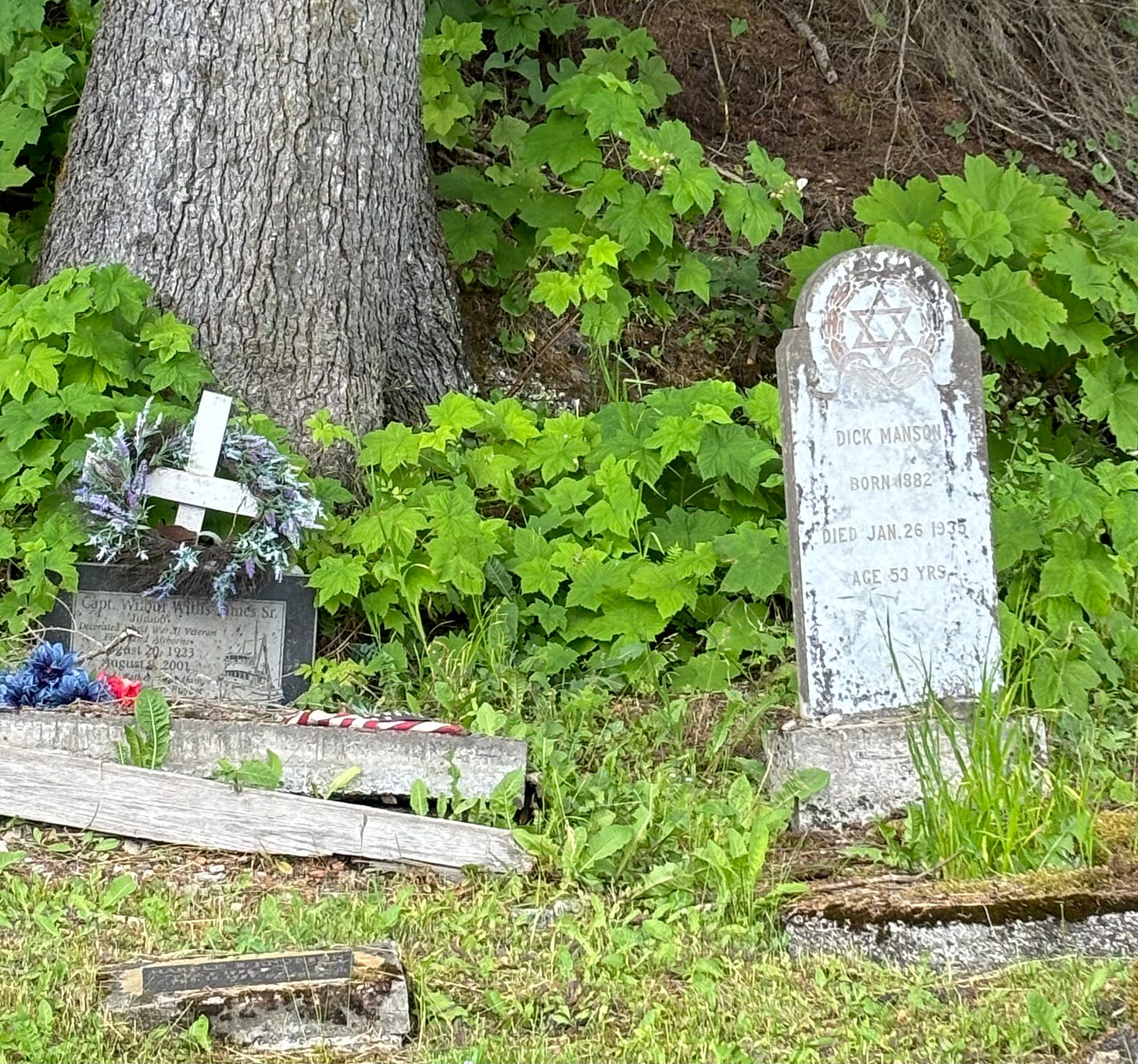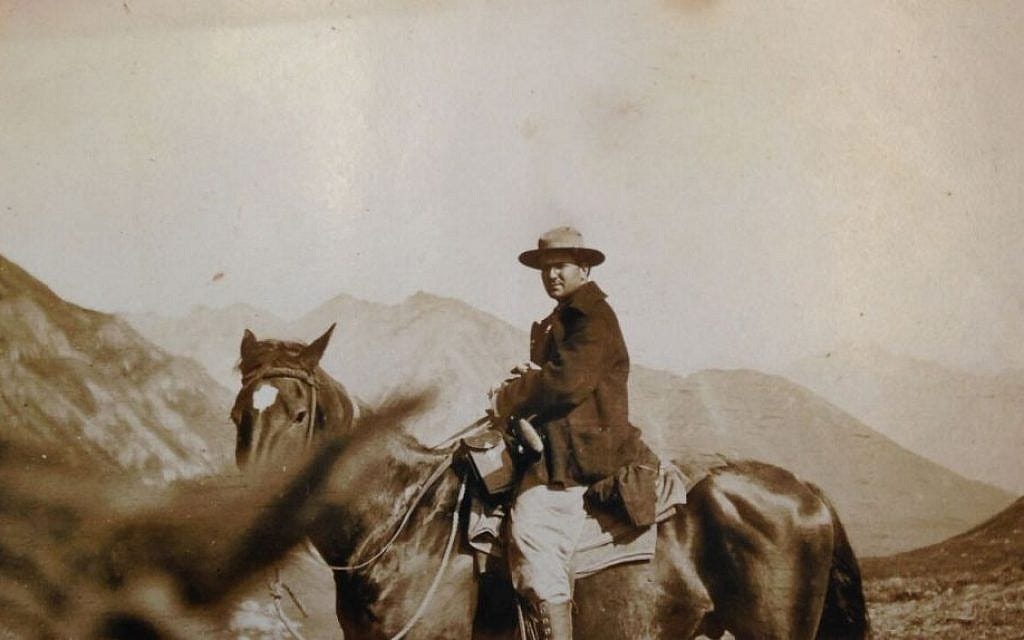The Frozen Chosen 101
A crash course on the Jews of Alaska.
Welcome back to The Shabbat Drop! Last week I was in Alaska, hiking, eating salmon, and looking for gold. Besides meeting some friendly Jews on my cruise from LA and Chicago, this was about as Jewish as my trip got:
I’ll have you know that my cruise partner and I were excited for the volunteer-led Shabbat service we saw on the Princess Cruise itinerary. However, we were so engaged (no, not that kind of engaged, sorry Mom חחח) in a discussion with the ship’s naturalist, Robert, about whales that we missed it!
So, to make up for it, over dinner we read an insightful and nostalgic d’var from the Jewish Substack, Torah Goes Hollywood, connecting Moses hitting the rock to Shel Silverstein’s The Giving Tree. Highly recommend the read! Both Silverstein’s words of wisdom and the d’var.
The Frozen Chosen
Some of you don’t know about Alaskan Jews and it shows. Whenever I tell people, “You know, Alaskan Jews are called the Frozen Chosen,” they giggle and say, “Oh, Miranda, you’re so funny!” And they’re wrong. Well, they’re right; I am funny. But they’re wrong in assuming I made up that name. Let the lesson commence.
The Frozen Chosen, as opposed to the Frozen Chosin, the nickname given to the U.S. soldiers who fought in the Battle of Chosin Reservoir during the Korean War (Korean War, shoutout to my dad!), got its start in the late 19th century, with Jews making their way over from Imperial Russia to live as fur traders. Some arrived from the continental U.S., mainly San Fransisco, in search of gold and stayed to develop communities, becoming businessmen and politicians.
Fun fact: after the U.S. purchased the Alaskan Territory from Russia in 1867, it was a Jewish soldier named Benjamin Levi who lowered the Russian flag and raised the flag of the U.S. at the site of the formal transfer of sovereignty in Sitka.
During World War II, the construction of military bases brought more people, including Jewish servicemen, to Alaska. Post-war, some stayed and laid down roots.
➡️ Further reading: For the past 150 years, Alaskan Jews have blazed trails in the last frontier
As of 2012, there are about 6,000 Jews spread out among Anchorage, Juneau, and Fairbanks. Anchorage, being the largest city, has the most Jews, with a few synagogues and a Chabad.
Someone asked me how Alaskan Jews observe Shabbat, but the real question is when, since the sun barely sets in the summer. Shabbat begins at sundown on Friday and ends at nightfall on Saturday, so by that logic, Shabbat there should start at around 10:30pm. Can you imagine?! My overly-fed stomach of buffet delicacies including at least two kinds of pasta and three desserts at every meal wouldn’t be able to handle eating so late. Instead, like Jews throughout history, they adapt.
It turns out many Alaskan Jews follow the practice of starting Shabbat at a fixed time in the evening, often at around 7 or 8pm, regardless of when the sun sets. In the winter, with very little daylight and Shabbat often starting in the early afternoon, they do the same thing with services starting a little earlier. This way, they can maintain a semblance of a traditional schedule. How reform of them!
A part of me wishes I visited a synagogue or Jewish museum to experience the local Jewry and its history, as I often like to do now when I travel, but I didn’t have time. Now I’m getting my post-travel depress- I mean, Jewish fix by informing you, dear reader, of this research.
At least I saw lawman Wyatt Earp’s gun at Juneau’s Red Dog Saloon, who I wrote about in my first piece with Jewish Unpacked - The Jews of the Wild West - because his wife, Josephine, was Jewish! In the throes of gold fever, the famous couple ran a successful saloon in Nome, Alaska, where in 1900, about 60 Jews attended a Rosh Hashanah service. See, it all circles back.
Thanks for reading! And if you experience local Jewry while traveling this summer, let me know! I’d love to hear about it. Or submit your story for a guest contribution.
Shabbat Shalom. Stay cool,








Welcome back home, where some like it hot. Perhaps i never told you this but in my first marriage, a warmup to the amazing one I have and continue to have with your mother, I met my father-in-law's brother, a nice guy who had just left his post as a rabbi in Alaska. He had then moved from Alaska to the promised land of Florida!
The more you travel, the more you come to realize how so many Jews have dispersed, flung for so many different reasons, to various parts of our planet, yet bringing love, joy, faith with them and sharing these attributes with others.
Welcome back.
Rosh Hashanah in a saloon - sign me up!